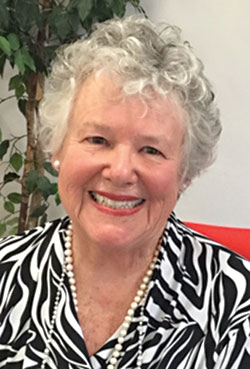
by Mary Wakefield Buxton –
Part 1 • Part 2 • Part 3 • Part 4
Part 5 • Part 6 • Part 7
Urbanna, Va.— One does not travel out of the country with a group of lawyers on a continuing education program with the Virginia Bar without exposure to foreign legal systems. For our group on the Vienna trip this meant a visit to the Austrian Supreme Court and a personal excursion through the court led by an Austrian Supreme Court Judge. We were most honored.
After explaining the origins of Vienna’s Palace of Justice, a grandiose building left over from the Hapsburg Empire when ornate palaces were built, we first admired the inscribed coats of arms from the various provinces once ruled by the Hapsburgs: mainly Hungary, Italian states, Czechoslovakia, Slovenia, Croatia and other territories now nations in their own right. This was evidence to our admiring group that the Hapsburg Empire is still very much in evidence in Austria.
Our personal guide, Supreme Court Justice Dr. Gerhard Kuars (lawyers go by the title of Dr in Austria), like most Austrians, spoke English as well as his own native German. He explained the court system to our group. Like the U.S. system, a case in Austria starts at the lowest level of district court, then, if appealed, rises to regional court, then to appeals court and finally the highest level of Supreme Court. We were amazed to hear coming from the U.S. with a discouraging 1,338,678 lawyers that Austria only has 5,500 lawyers and 1,200 judges.
What really fascinated us was hearing the European Union (EU) Supreme Court could overrule any of its member EU nations Supreme Court decisions and even fine that nation if final judgments were deemed to be against EU laws. This would be as amazing to Americans if our Supreme Court rulings could ever be overruled by any “global court.” However, it was explained, the EU Court could fine the EU member country for disobeying their laws, but it could not change the final judgement, at least at this point in time. The judge said, however, just living under constant threat of EU fines definitely flavored their decisions.
The judge spoke of how frustrating it was for judges to have to consider Austrian laws and how they related to EU laws. One certainly would have to have a sense of humor to serve as Supreme Court judge in the EU nations.
On top of EU overview, member nations’ decisions could be taken to the human rights court which had been agreed upon by treaty that certain rights could not be disregarded by any individual member nation. I thought of abortion, divorce, child custody and gender issues that would certainly be in constant conflict amongst EU nations either due to religious or cultural differences and wondered how such diversity would ever be compromised.
We learned organizing the European Union was not easy and the process was still working through many complications. I thought of our American history and how the 13 original colonies had similarly struggled to find a way to come together and agree on our U.S. Constitution. In order to do this, our founding fathers each had to agree to give up some rights in each colony in order to form a federal union just as the EU had to do. It’s never easy for any nation to give up rights and it certainly wasn’t easy for Americans who had fought so long with Great Britain to obtain such rights. The colonies did not want to create a federal government that could one day be as dictatorial as the English king.
I came to the conclusion that the long and unending history of devastating European wars necessitated the EU . . . so in spite of the constant problems the individual members have to become one nation it is worth the effort in the hopes of finally living in peace.
After our tour we were taken to the Schonherr Law Firm, a firm of over 300 lawyers with offices in Austria, Belgium, Bulgaria, Croatia, Czech, Hungry, Moldova, Montenegro, Poland, Romania, Serbia, Slovakia, Slovenia and Turkey, and desks in Albania, Bosnia, Herzegovina, Macedonia and Ukraine.
We met three of the partners. “But how do you speak all the languages of all the many nations?” I asked.
One partner answered me that he spoke seven languages, which fit the bill.
It didn’t take me long to realize this law firm had in their own way replaced the Hapsburg Empire. They established themselves as soon as the Iron Curtain came down. How brilliant was their business plan when it was obvious these same areas would need legal help forming private businesses in the wake of the collapse of communism and what a fortune they must have made. Leave it to the lawyers the world over to figure out how to do this. Needless to say, coming from a Virginia law firm of three lawyers and four offices that only speak one language, I was well impressed! (Conclusion next week) ©2020



